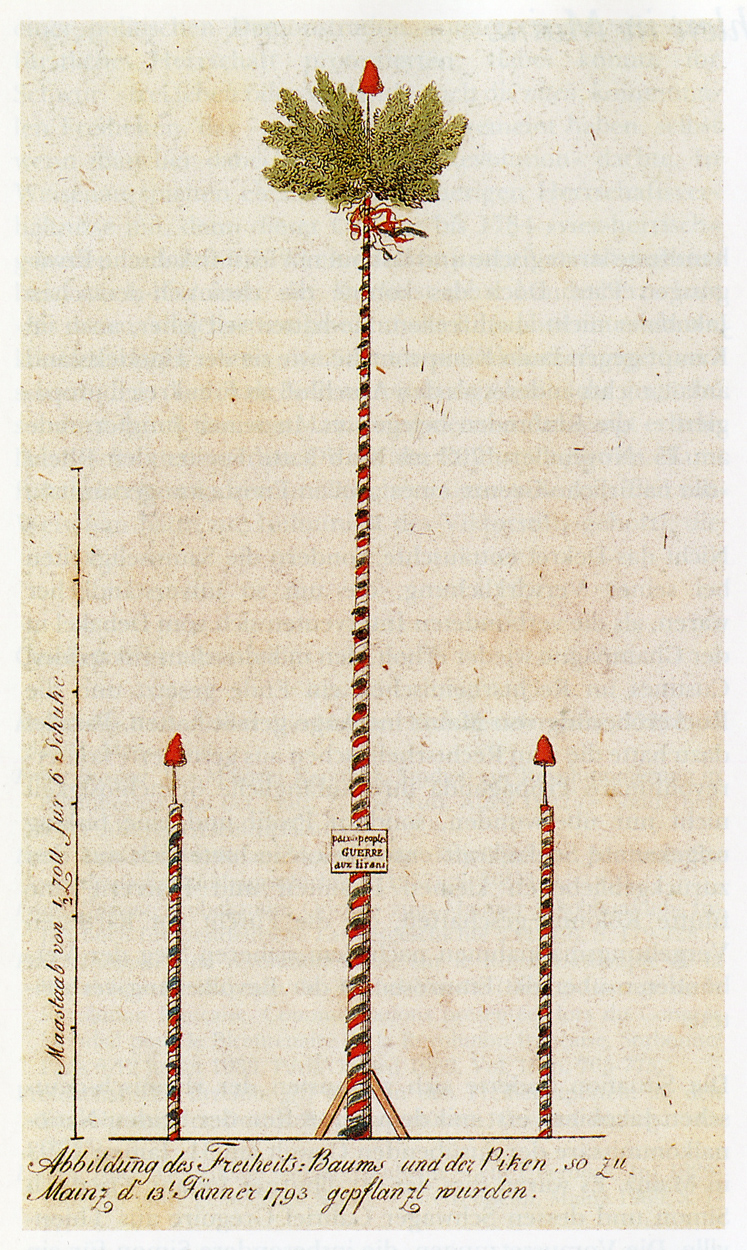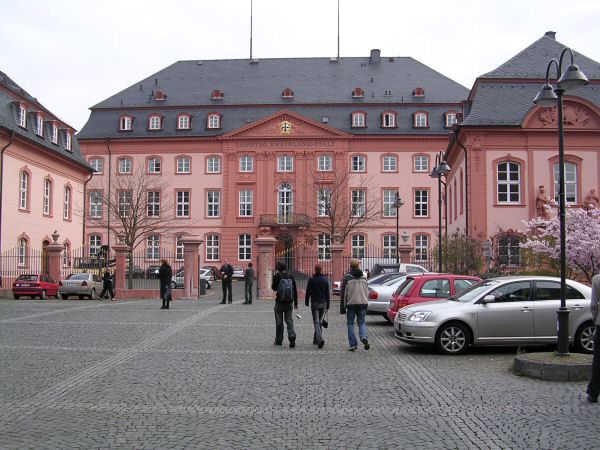Republic Of Mainz on:
[Wikipedia]
[Google]
[Amazon]
 The Republic of Mainz was the first democratic state in the current
The Republic of Mainz was the first democratic state in the current

 The Republic of Mainz was the first democratic state in the current
The Republic of Mainz was the first democratic state in the current German
German(s) may refer to:
* Germany (of or related to)
**Germania (historical use)
* Germans, citizens of Germany, people of German ancestry, or native speakers of the German language
** For citizens of Germany, see also German nationality law
**Ger ...
territoryThe short-lived republic is often ignored in identifying the "first German democracy", in favour of the Weimar Republic
The Weimar Republic (german: link=no, Weimarer Republik ), officially named the German Reich, was the government of Germany from 1918 to 1933, during which it was a constitutional federal republic for the first time in history; hence it is al ...
; e.g. "the failure of the first German democracy after the First World War (the Weimar Republic)..." (Peter J. Burnell, ''Democracy Assistance: international co-operation for democratization'' 2000:131), or Ch. 3. 'The First Attempt at Democracy, 1918–1933', in Michael Balfour, ''West Germany: a contemporary history'', 1982:60 and was centered in Mainz
Mainz () is the capital and largest city of Rhineland-Palatinate, Germany.
Mainz is on the left bank of the Rhine, opposite to the place that the Main (river), Main joins the Rhine. Downstream of the confluence, the Rhine flows to the north-we ...
. A product of the French Revolutionary Wars
The French Revolutionary Wars (french: Guerres de la Révolution française) were a series of sweeping military conflicts lasting from 1792 until 1802 and resulting from the French Revolution. They pitted French First Republic, France against Ki ...
, it lasted from March to July 1793.
Context
During theWar of the First Coalition
The War of the First Coalition (french: Guerre de la Première Coalition) was a set of wars that several European powers fought between 1792 and 1797 initially against the Kingdom of France (1791-92), constitutional Kingdom of France and then t ...
against France
France (), officially the French Republic ( ), is a country primarily located in Western Europe. It also comprises of Overseas France, overseas regions and territories in the Americas and the Atlantic Ocean, Atlantic, Pacific Ocean, Pac ...
, the Prussian
Prussia, , Old Prussian: ''Prūsa'' or ''Prūsija'' was a German state on the southeast coast of the Baltic Sea. It formed the German Empire under Prussian rule when it united the German states in 1871. It was ''de facto'' dissolved by an e ...
and Austrian
Austrian may refer to:
* Austrians, someone from Austria or of Austrian descent
** Someone who is considered an Austrian citizen, see Austrian nationality law
* Austrian German dialect
* Something associated with the country Austria, for example: ...
troops that had invaded France retreated after the Battle of Valmy
The Battle of Valmy, also known as the Cannonade of Valmy, was the first major victory by the army of France during the Revolutionary Wars that followed the French Revolution. The battle took place on 20 September 1792 as Prussian troops comm ...
, allowing the French revolutionary army to counterattack. The troops of General Custine entered the Palatinate in late September and occupied Mainz on 21 October 1792. The ruler of Mainz, Elector
Elector may refer to:
* Prince-elector or elector, a member of the electoral college of the Holy Roman Empire, having the function of electing the Holy Roman Emperors
* Elector, a member of an electoral college
** Confederate elector, a member of ...
-Archbishop
In Christian denominations, an archbishop is a bishop of higher rank or office. In most cases, such as the Catholic Church, there are many archbishops who either have jurisdiction over an ecclesiastical province in addition to their own archdi ...
Friedrich Karl Joseph von Erthal
Friedrich Karl Joseph Reichsfreiherr von Erthal (3 January 1719 – 25 July 1802) was prince-elector and archbishop of Mainz from 18 July 1774 to 4 July 1802, shortly before the end of the archbishopric in the ''Reichsdeputationshauptschluss''.
F ...
, had fled the city.
Jacobin club
On the next day, 20 citizens of Mainz founded aJacobin
, logo = JacobinVignette03.jpg
, logo_size = 180px
, logo_caption = Seal of the Jacobin Club (1792–1794)
, motto = "Live free or die"(french: Vivre libre ou mourir)
, successor = Pa ...
club, the ' ( en, Society of the Friends of Liberty and Equality). Together with their filial clubs founded later in Speyer
Speyer (, older spelling ''Speier'', French: ''Spire,'' historical English: ''Spires''; pfl, Schbaija) is a city in Rhineland-Palatinate in Germany with approximately 50,000 inhabitants. Located on the left bank of the river Rhine, Speyer li ...
and Worms Worms may refer to:
*Worm, an invertebrate animal with a tube-like body and no limbs
Places
*Worms, Germany, a city
**Worms (electoral district)
*Worms, Nebraska, U.S.
*Worms im Veltlintal, the German name for Bormio, Italy
Arts and entertainme ...
, they promoted the Enlightenment and the French revolutionary ideals of ' in Germany, aiming for a German republic to be established following the French model. Most of the founding members of the Jacobin club were professors and students of the University of Mainz
The Johannes Gutenberg University Mainz (german: Johannes Gutenberg-Universität Mainz) is a public research university in Mainz, Rhineland Palatinate, Germany, named after the printer Johannes Gutenberg since 1946. With approximately 32,000 stu ...
, together with the university librarian, Georg Forster
Johann George Adam Forster, also known as Georg Forster (, 27 November 1754 – 10 January 1794), was a German naturalist, ethnologist, travel writer, journalist and revolutionary. At an early age, he accompanied his father, Johann Reinhold F ...
, some merchants and Mainz state officials. For some time the ecclesiastic was president of the club and editor of the ' ( en, Mainz National Newspaper).
Founding
By order of theFrench National Convention
The National Convention (french: link=no, Convention nationale) was the parliament of the Kingdom of France for one day and the French First Republic for the rest of its existence during the French Revolution, following the two-year National ...
, elections in the French-occupied territories west of the Rhine
), Surselva, Graubünden, Switzerland
, source1_coordinates=
, source1_elevation =
, source2 = Rein Posteriur/Hinterrhein
, source2_location = Paradies Glacier, Graubünden, Switzerland
, source2_coordinates=
, so ...
were held on 24 February 1793. 130 cities and towns sent their deputies to Mainz. The first democratically elected parliament
In modern politics, and history, a parliament is a legislative body of government. Generally, a modern parliament has three functions: Representation (politics), representing the Election#Suffrage, electorate, making laws, and overseeing ...
on the territory of future Germany, called the ' ( en, Rhenish-German National Convention), met initially on 17 March 1793, in the Deutschhaus building in Mainz (today the seat of the Rhineland-Palatinate
Rhineland-Palatinate ( , ; german: link=no, Rheinland-Pfalz ; lb, Rheinland-Pfalz ; pfl, Rhoilond-Palz) is a western state of Germany. It covers and has about 4.05 million residents. It is the ninth largest and sixth most populous of the ...
state parliament). The convention declared the represented territory (which extended to Bingen in the west and to Landau
Landau ( pfl, Landach), officially Landau in der Pfalz, is an autonomous (''kreisfrei'') town surrounded by the Südliche Weinstraße ("Southern Wine Route") district of southern Rhineland-Palatinate, Germany. It is a university town (since 1990 ...
in the south) to be free and democratic, and disclaimed any ties to the empire
An empire is a "political unit" made up of several territories and peoples, "usually created by conquest, and divided between a dominant center and subordinate peripheries". The center of the empire (sometimes referred to as the metropole) ex ...
. The convention's president, Andreas Joseph Hofmann
Andreas Joseph Hofmann (14 July 1752 – 6 September 1849) was a German philosopher and revolutionary active in the Republic of Mainz. As Chairman of the Rhenish-German National Convention, the earliest parliament in Germany based on the princi ...
, proclaimed the Rhenish-German Free State (german: Rheinisch-Deutscher Freistaat) from the balcony of the Deutschhaus. On 21 March 1793, it was decided to seek the accession of the Free State to France and delegates (among them Georg Forster
Johann George Adam Forster, also known as Georg Forster (, 27 November 1754 – 10 January 1794), was a German naturalist, ethnologist, travel writer, journalist and revolutionary. At an early age, he accompanied his father, Johann Reinhold F ...
and Adam Lux
Adam Lux (27 December 1765 – 4 November 1793) was a German revolutionary and sympathiser of the French Revolution.
Life
Early life
Lux was born in Obernburg am Main, a village belonging to the Electorate of Mainz, as a farmer's son. However, ...
) were sent to Paris
Paris () is the capital and most populous city of France, with an estimated population of 2,165,423 residents in 2019 in an area of more than 105 km² (41 sq mi), making it the 30th most densely populated city in the world in 2020. S ...
. The French National Convention granted the request on 30 March.
End
Soon after, Prussian troops retook all the French-occupied territory except for the heavily fortified city of Mainz itself. After a longsiege
A siege is a military blockade of a city, or fortress, with the intent of conquering by attrition warfare, attrition, or a well-prepared assault. This derives from la, sedere, lit=to sit. Siege warfare is a form of constant, low-intensity con ...
in which much of the city was destroyed, Prussian and Austrian troops conquered the city on 22 July 1793. The republic ended, and the Jacobins were persecuted until 1795 when Mainz came under French control again.
Notes
Further reading
* * * {{DEFAULTSORT:Mainz, Republic Former states and territories of Rhineland-PalatinateRepublic of Mainz
The Republic of Mainz was the first democratic state in the current German territoryThe short-lived republic is often ignored in identifying the "first German democracy", in favour of the Weimar Republic; e.g. "the failure of the first Germa ...